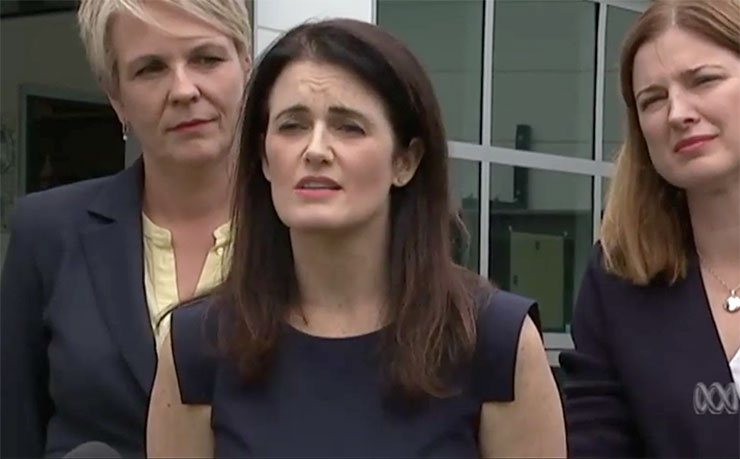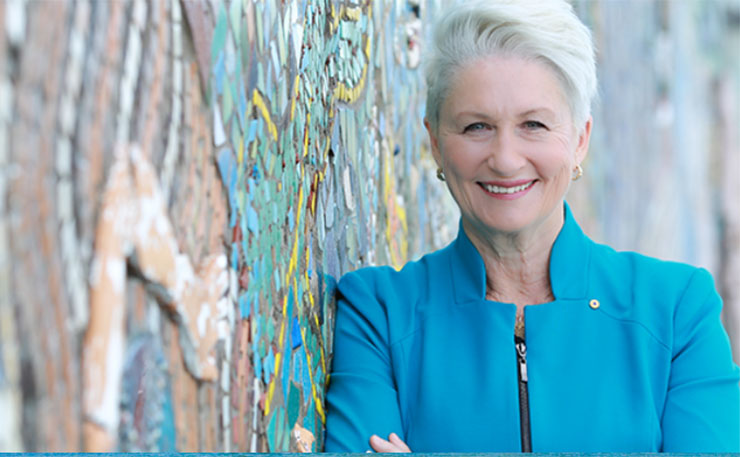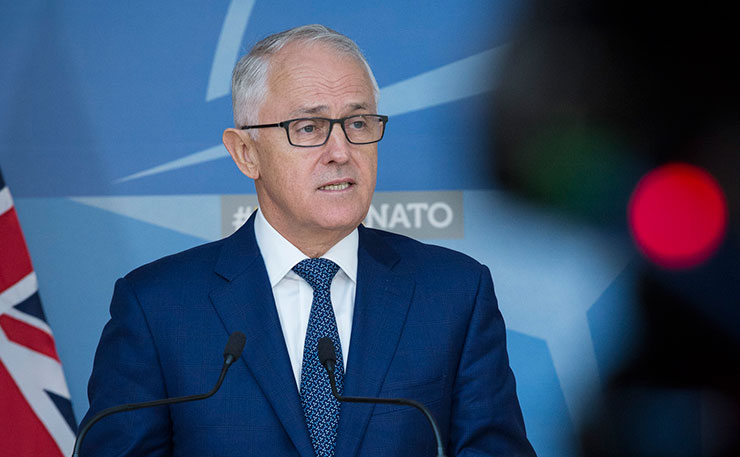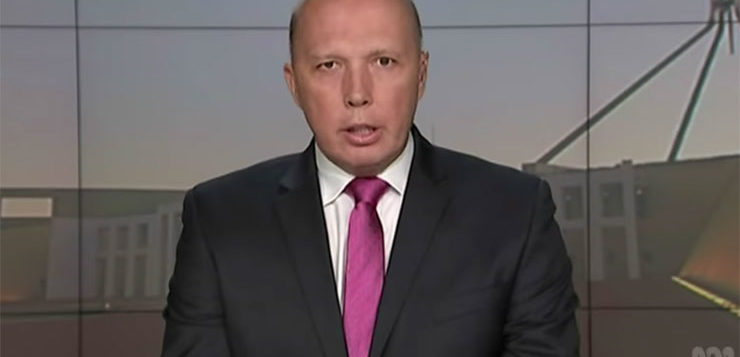DON’T MISS ANYTHING! ONE CLICK TO GET NEW MATILDA DELIVERED DIRECT TO YOUR INBOX, FREE!
The Coalition lacks policies. It also lacks charisma. It has no other option but fear, writes Ben Eltham.
The onset of the election campaign is a stroke of relief. At last we’re going to actually get a vote.
After a pre-election budget that showered tax cuts on the middle and upper classes, the government prevaricated for a week, before finally pulling the trigger on Thursday, setting a date for May 18.
Even this turned out to be an anti-climax, because in truth Morrison had little choice: constitutional deadlines dictate an election in May. Even so, at 5 weeks, this is going to be a long and taxing campaign.
All too predictably, the Coalition has started badly. A disastrous gaffe by Home Affairs Minister Peter Dutton becoming the main story of week one. Speaking to The Australian, Dutton criticised his opponent in his home seat of Dickson, Labor’s Ali France, accusing her of “using her disability as an excuse for not moving into the electorate”.

This didn’t go down well. Disability groups condemned Dutton’s insensitivity, pointing out that accessible housing for amputees like France is expensive and in very short supply. Many ordinary voters were appalled. Labor used the opportunity to point out that Dutton himself spent much of his time in a mansion on the Gold Coast, an hour down the highway from Dickson.
Within days, Dutton was forced to issue a grudging apology, making him look simultaneously mean and ungracious. France kept door knocking. She must know she is a good chance to win the seat.
Seats like Dickson epitomise the mountain the Coalition must climb if it is to win re-election. Held by Dutton on a thin 1.7 per cent margin, it would be vulnerable in any election. With the Coalition on the nose across most states and in many different demographics, the scale of the challenge to hold such vital marginals is readily apparent.
The Coalition has many problems, but perhaps its biggest is electoral arithmetic. The government enters the campaign with a majority of just one in the House of Representatives. Redistributions and redistricting makes the task even harder. The Liberal and National parties must not only hold all their current seats; they need to pick up seats from Labor in order to retain government.
In this respect, the electoral pendulum tells against them across the country. Seats like Corangamite and Dunkley in Victoria have been redistributed in favour of the ALP, such that they are now notionally Labor seats on 2016 results. A swag of other seats are highly marginal. There are eight Coalition seats on margins of less than 2 per cent, including Dickson. Even a small swing to Labor will see these tumble.
It’s true, of course, that Labor also has marginal seats. If the LNP can win marginal ALP seats like Longman, Herbert and Griffith in Queensland, Lindsay in Sydney, and Cowan in Perth, it will stand a good chance of winning. All of this is another way of saying that if it is to gain re-election, the government needs a swing towards it. Looking at the current landscape of federal politics, it’s hard to see where that groundswell of support will come from.
It barely needs restating, but the Coalition enters this campaign well behind Labor in the opinion polls. The government has torched an astonishing amount of political capital in the past year, deposing a sitting prime minister strongly preferred by voters, and jettisoning decades worth of experienced ministers, such as Julie Bishop and Christopher Pyne. A disastrous 2018 was capped by the devastating loss of Malcolm Turnbull’s seat of Wentworth to independent Kerryn Phelps in a by-election, a seat the government needs but will now have to devote substantial resources and struggle to win back.

But it’s even worse than that. Dan Andrews’ smashing election win in November in Victoria suggests that a slew of formerly conservative Melbourne seats are vulnerable. Strongholds in Melbourne’s east and south like Chisholm, Aston, Casey, and La Trobe seem suddenly marginal. Such is the ferment in blue ribbon Liberal districts, even jewels in the Liberal crown like Higgins seem at risk.
The Coalition’s vulnerability is not just confined to Victoria or Queensland. Parts of Sydney are vulnerable; regional National seats could fall to independents; even Western Australia is looking suddenly weak. Given such difficulties, Morrison needs some good fortune, and a good campaign.
This is why Dutton’s horror start to the campaign sums up the Coalition’s predicament. The very fact that a senior Coalition figure like the Home Affairs Minister can stumble into a damaging gaffe in the first week of the campaign shows the parlous situation the government faces. Dutton, a former Queensland police detective, has made a career out of his tough and unapologetic posturing. But punching down has its drawbacks as a political strategy, especially when your victim is a photogenic mother who lost a leg protecting her child from a speeding car.
If the damage is serious in Brisbane, in more moderate parts of the country, the fallout has been nuclear. Senior Labor figures are openly backgrounding journalists about Dutton’s radioactive unpopularity in Melbourne, where he is seen as mean-spirited and out of touch. Kristina Kenneally, rapidly emerging as one of Labor’s best campaigners, summed up the mood when she called him a “thug”.
Looming over everything Morrison does is the figure of Malcolm Turnbull. As Julia Gillard found out, deposing a popular leader isn’t easy to explain, however many times you dismiss such questions as scuttlebutt from the “Canberra bubble”.
Turnbull’s absence is all the more noticeable because of Morrison’s underwhelming presence. The new prime minister has barely been in the job seven months. He has not managed to carve out a dynamic political identity in that time, notwithstanding his well-established love for the Cronulla Sharks. Nor has he been able to establish a bold policy agenda… or any kind of policy agenda, come to think of it.

Malcolm Turnbull also struggled to articulate a bigger picture for Australia, but middle-class voters liked his mix of economic orthodoxy and social progressivism. Morrison cannot possibly claim to be socially liberal, and his odd mix of evangelism and marketing hype does not much impress well-heeled professionals either. It says a lot that Josh Frydenberg, a young Treasurer only just finding his feet in national politics, is probably the Coalition’s best asset.
With Frydenberg’s pre-election budget, the government has at least got a fiscal policy it can campaign on, even if that policy is targeted mostly at the rich and the upper-middle classes. But beyond the tax cuts coming on July 1, most of the tax relief for the wealthy doesn’t arrive until 2023 – two elections away. And lower-middle class voters will do better from Labor. At least there are some small-scale infrastructure projects to bandy about the marginal seats.
Lacking in charisma and bereft of policy, the Coalition’s best chance is therefore to run negative. After all, if you can’t govern like a government, why not try opposing like an opposition?
And so we’ve had a slew of overblown scare campaigns on electric vehicles (Labor wants to take away your ute), carbon emissions (Labor is bringing back the carbon tax), franking dividends (Labor’s retirement tax) and minimum wages (Labor wants to pay some workers more, while other workers will get sacked). Many of these attack lines are irresponsible distortions; some are simply outright lies. But that won’t stop the Coalition from repeating them.
Negative campaigns obviously do work, otherwise politicians wouldn’t resort to them as their favourite method of communication. But not all scare campaigns are effective. To succeed, they must seem plausible, and voters need to be paying attention. Turning up the klaxons to eleven fires up the base and gathers headlines in friendly media outlets. But it risks making your position seem exaggerated and shrill. And they’re pointless if voters aren’t listening.
Labor has spent years honing and sandbagging its policy platform, which on any sensible judgment is moderate and achievable. In contrast, the Coalition has spent the last three years consumed by its own internal hatreds. Now that the crisis has arrived, the Coalition finds itself without a coherent assault plan to break down Labor’s platform. Time is running out.
DON’T MISS ANYTHING! ONE CLICK TO GET NEW MATILDA DELIVERED DIRECT TO YOUR INBOX, FREE!
Donate To New Matilda
New Matilda is a small, independent media outlet. We survive through reader contributions, and never losing a lawsuit. If you got something from this article, giving something back helps us to continue speaking truth to power. Every little bit counts.




